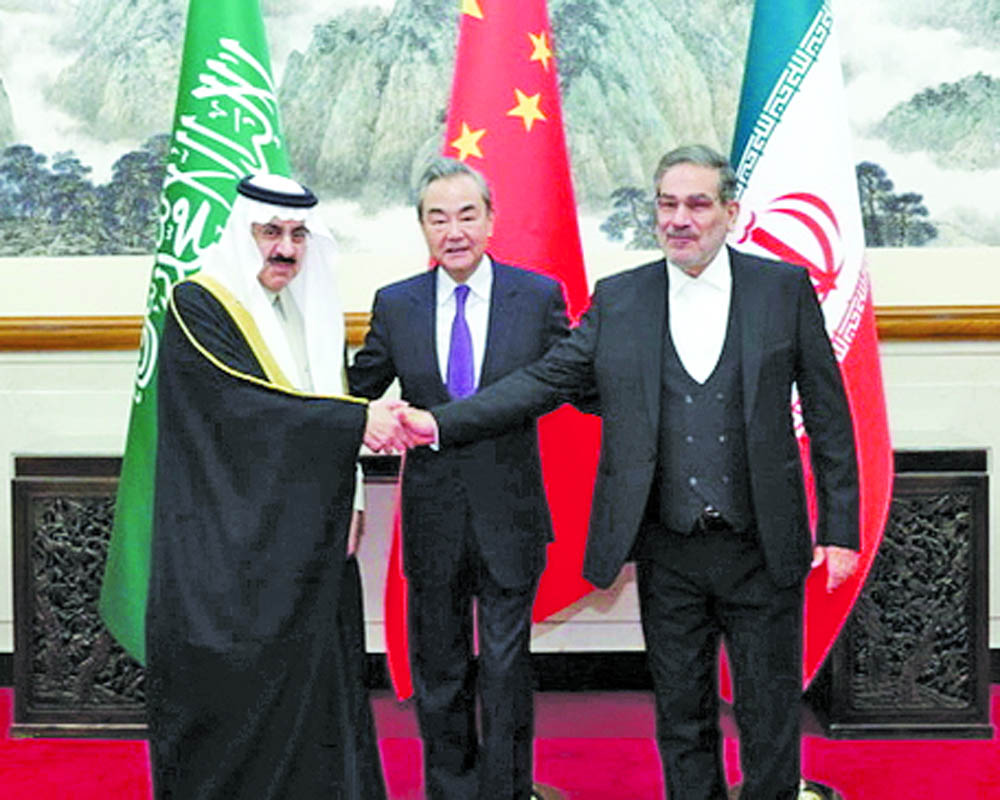Thaw in the Iran-Saudi Arabia relations is welcome as it would lessen the tension in the region but it would have been better had India mediated it
The news that Iran and Saudi Arabia have agreed to resume their diplomatic ties sent many into a tizzy. The sense of disbelief was of course expected, as Iran and Saudi Arabia have been fighting in the Middle East region for greater influence for many years now. Their proxy wars, most notably in Yemen, have resulted in a tragic humanitarian crisis. Add to it the role of the United States, which has sanctioned and threatened Iran for years but has maintained excellent ties with the Saudis.
China, of course, is the one making the headlines here, as it brokered the talks in Beijing, and the pictures emerging from there show China holding centre stage with Iran and Saudi officials on either side. There can hardly be a debate that this is China’s big moment. They have stepped into a region that until now was the domain of the US, and it has proved that China can help usher in peace where others have failed. While the US has publicly welcomed this deal, there can be little doubt about how disquieting this would be for them. The US has been trying to convince the Saudis to establish ties with Israel. Iran has been a perennial headache for them, and this turn of events doesn’t suit them at all.
While reactions have poured in from various corners of the world, some cautious and some a little more euphoric, India is yet to react. The silence then tells another story. On the surface, there is renewed apprehension that China has yet again stolen a march over others. Given the present situation where India-China ties are stressed and strained, this is hardly a happy scenario for India. But what also needs to be learned from this entire episode is how India seems to have missed a great opportunity to show its diplomatic finesse on the global stage. India is one of the few countries in the world today that enjoys excellent relations with both Iran and Saudi Arabia. For that matter, in the last decade or so, India’s ties with the Gulf nations have seen an upward trend, and that in itself has been a commendable achievement. So with some foresight, India could have brokered this deal or maybe attempted to do so.
The problem of late in India’s foreign policy, however, seems to be India’s obsession with Quad diplomacy. While there is no doubt that Quad has emerged as one of the successful groupings of late and is today at the forefront as far as the Indo-Pacific is concerned, it has also resulted in a neglect of other regions and areas of diplomacy. For India, which is fast emerging as an influential voice on the world scene, this China-brokered deal will be a matter of great concern. First, it gives China a certain global positioning as a doer. Two, it gives China space and an advantage in the Middle East region, and lastly, it helps China nudge out the US in the Middle East and claim that space for itself.
India has been developing a close relationship with the US for many years, and today this is one of the strongest partnerships India shares globally. But India must not let its entire vision of foreign affairs get dominated by an American perspective. Talks between Iran and Saudi Arabia have been going on for a while now, and they also held talks in Iraq and Oman. For India, this was an opportunity worth exploiting. But the recent attention on Ukraine and the single-minded focus on maybe playing a mediator between Russia and Ukraine overshadowed other regions and concerns. Even in the Ukraine conflict, it is China that is increasingly being seen as an important player, and the growing Russia-China nexus is a clear indication of that.
The success of this deal will become clear in the coming weeks. In the next two months, the two countries are expected to take several steps towards normalizing their ties. After seven bitter years of hostility, this truce could bring peace and stability to the region and also lend stability to the energy market. As is expected, each actor in this deal went in with their own interests. The Saudis under Mohammed bin Salman (MBS) want to renew their focus on economic development.
It is also an indication of the Saudis' desire to move away from the overwhelming US influence and form their own foreign policy. Iran, whose economy has been struggling under US sanctions and regional isolation, sees in this an opportunity to seek Chinese investment and reduce its US footprint in the region. For China, this is its ‘aha’ moment. They have displaced the US from the region and stepped in to fill a vacuum while the US is busy in Ukraine and the Indo-Pacific.
For India, this is a missed opportunity and also a bit of a wake-up call. India needs to build on its own strengths and historical ties and not get pulled into an essentially Western world view. The Ukraine conflict might be the US and Europe’s top priority, but with India enjoying excellent relations with both Ukraine and Russia, it needs to be looking at the rest of the world too.
(The authors is a Delhi-based journalist and foreign affairs analyst. The views expressed are personal)


























